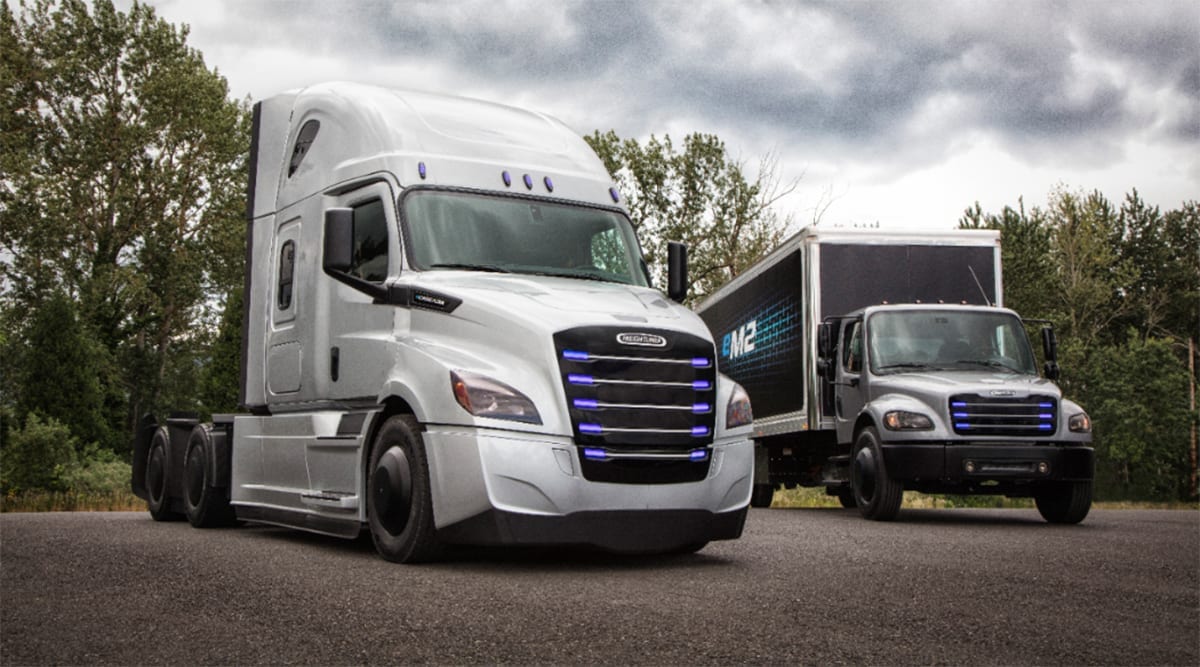In a landmark announcement on July 6th, California’s South Coast Air Quality Management District (SCAQMD) and Daimler Trucks North America (DTNA), the world leader in heavy-duty truck sales, announced the launch of a $31.3 million project to develop and demonstrate electric truck technology for the heavy-duty market. The project will play a tremendously important role in the transformation of the heavy-duty transportation market, from one that is entirely too dependent on petroleum fuels to one that can be powered by renewable electricity.
The Zero Emission Trucks and EV Infrastructure Project will be instrumental in accelerating the commercial readiness of battery-electric heavy-duty trucks, as it will test and deploy the vehicles in real-world commercial fleet operations, gathering data and information from end-users. The trucks will operate in and around the communities of the South Bay and South Los Angeles that are disproportionately impacted by diesel-fueled truck traffic and their related emissions.
Demonstration and commercialization projects will be crucial to help deploy, test, and reduce costs for zero emission technologies. This project is one of the largest electric truck demonstrations initiated using air district funds.
Demonstration and commercialization projects will be crucial to help deploy, test, and reduce costs for zero emission technologies. This project is one of the largest electric truck demonstrations initiated using air district funds.
The project is expected to begin later this year with all twenty trucks to be in operation by April 2019. The demonstration fleet will consist of twenty heavy-duty battery-electric trucks – ten Class 8 Freightliner eCascadias and ten Class 6 Freightliner eM2s – including associated charging infrastructure with energy storage systems. Seven of the eCascadias will be used in port drayage operations at the Ports of Long Beach and Los Angeles to support the goods movement industry.
The eCascadia is designed to have a range of up to 250 miles (400 kilometers) between charges while the smaller eM2 will operate with a range of about 230 miles. Both vehicles will plug into a Combined Charging Standard Type 1 (CCS T1) charger. DTNA will install DC fast charger stalls at the identified fleet locations and provide an adequate number of chargers to support this fleet of battery-electric trucks. Each fast charger will be paired with multiple battery energy storage systems to optimize utility costs and reduce infrastructure enhancements required to support the chargers. The proposed chargers will take two to three hours to charge the vehicles up to 80%.
Serving as one of the main catalysts for the project, the San Pedro Bay Ports Clean Air Action Plan, adopted by the Ports of Long Beach and Los Angeles, lays the groundwork for the ports to deploy zero emission vehicles and equipment in the coming years. The Plan has generated incredible enthusiasm from stakeholders throughout the ports for electric truck technologies. It is widely accepted there are many benefits to electric trucks, but the cost of the current technologies and the availability of charging assets still present considerable hurdles to widespread deployment of such vehicles.
DTNA will serve as the primary investor in the project, allocating $15.6 million towards the demonstration of these innovative vehicles. SCAQMD will provide $13.6 million and additional support will be provided by $2 million from the Ports of Long Beach and Los Angeles and $500,000 from the U.S. Environmental Protection Agency’s Region 9.
The evolution of the on-road heavy-duty transportation industry is at a critical stage – there is substantial need to address the sources of smog, toxic air contamination, and the worst of the short-lived climate pollutants, black carbon.
Demonstration projects are key to deploying zero emission technologies, and ultimately reducing the costs of these technologies. Truck manufacturers like DTNA need to collect operational data in order to further develop and refine electrified vehicle technologies. As such, DTNA will use this project to continue its product development cycle from pre-commercial demonstrations in early 2019 to full-scale commercialization in 2021.
The evolution of the on-road heavy-duty transportation industry is at a critical stage – there is substantial need to address the sources of smog, toxic air contamination, and the worst of the short-lived climate pollutants, black carbon. It is thus clear that electric truck technologies will play a major role in sustainable goods movement. Industry leaders like DTNA, with considerable support from SCAQMD and the Ports of Long Beach and Los Angeles, are moving forward boldly to make this a reality in the near-term. With such tremendous benefits to be provided by this noteworthy project and noteworthy partners, it is no surprise that this effort has gained widespread support from the region’s leading community and government agencies working to accelerate a zero-emission transportation future.



